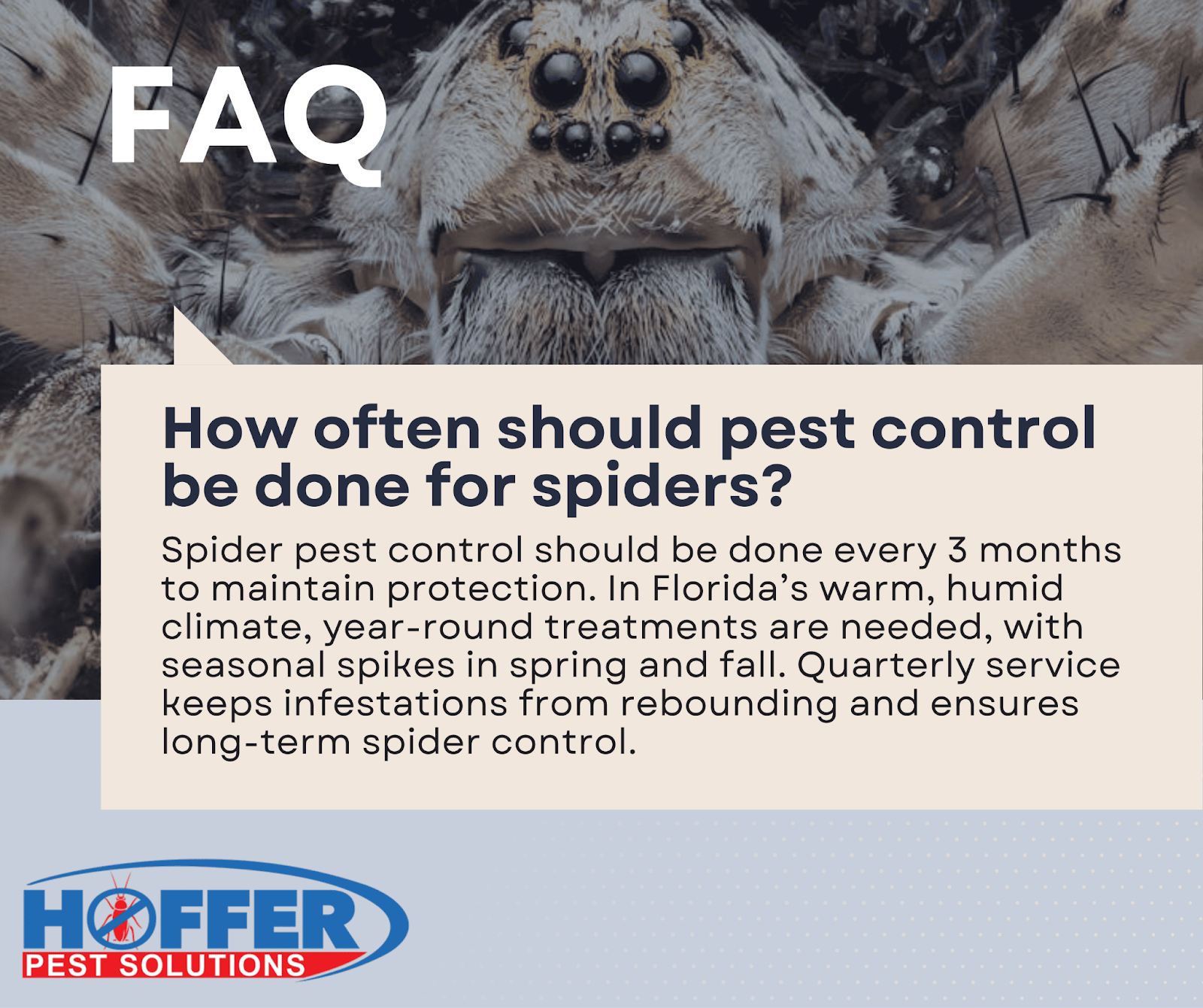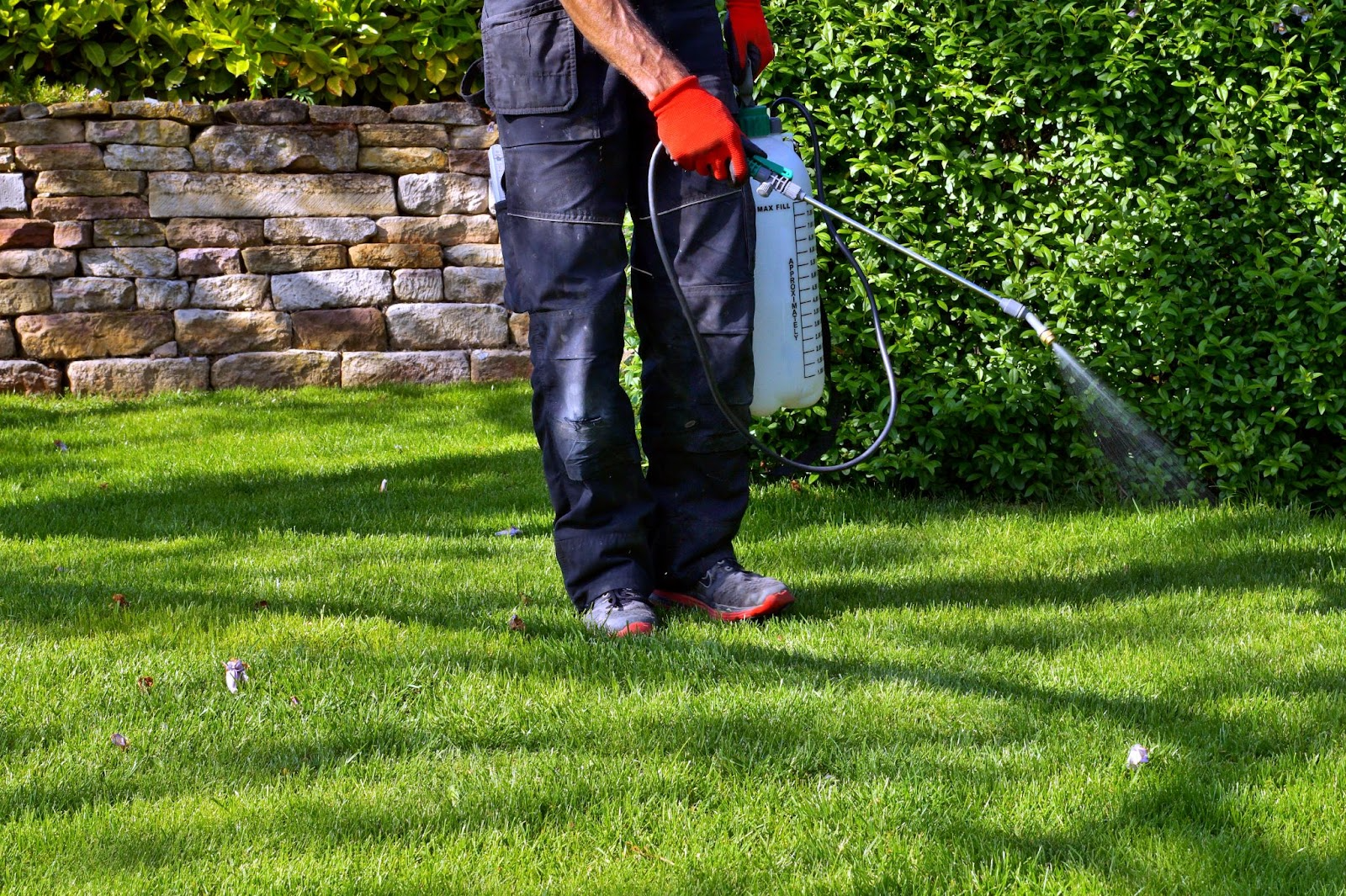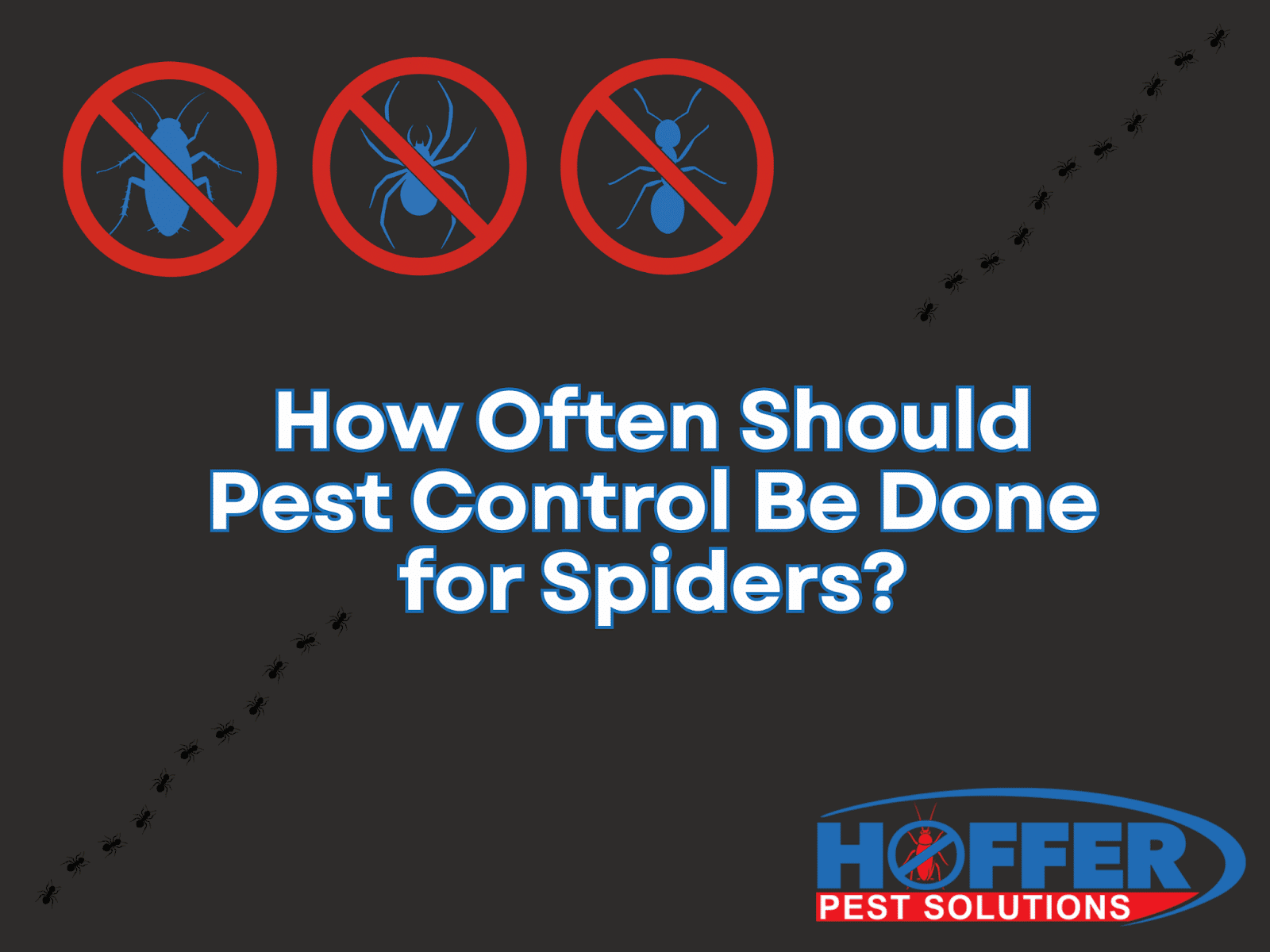Spider pest control should be done every 3 months to maintain protection. In Florida’s warm, humid climate, year-round treatments are needed, with seasonal spikes in spring and fall. Quarterly service keeps infestations from rebounding and ensures long-term spider control.

The right frequency depends on where you live, the type of home you own, and even the weather conditions in your area. Florida homeowners face unique challenges that make consistent service far more significant than in colder states where pests slow down in winter.
Hoffer Pest Solutions spent over 40 years helping South Florida families enjoy homes free from spiders and other pests. Our quarterly plans reduce the insects that attract them in the first place, giving you reliable protection and peace of mind.
If you want the full breakdown of when and why spider treatments are necessary, keep reading. We’ll cover seasonal patterns, home-specific risk factors, and how professional pest control compares to DIY efforts so you can make the best decision for your home.
Why Spider Control Frequency Isn’t One-Size-Fits-All
Every home and every environment is different, and so is the right pest control schedule. A well-sealed, newer home may stretch comfortably to quarterly service, while an older house with crawlspaces may need treatments every other month. Spider species also matter, some reproduce slowly, while others lay dozens of eggs at once, which means re-infestations happen faster if treatments are delayed.
It’s also normal to still see spiders occasionally, even months after treatment. In fact, spotting dead spiders is a sign the residual product is working, not failing. Yet many homeowners understandably worry that a live sighting means the service didn’t “stick.” The reality is that no treatment erases all spiders instantly, but consistent scheduling prevents them from taking over.
Seasonal Patterns & Florida’s Unique Spider Challenges

In most regions, spring and fall bring the biggest spider migrations as weather shifts push them indoors or outdoors. But Florida plays by its own rules. Here, spiders don’t go dormant in winter, the steady warmth and humidity keep them active all year. That means quarterly service is the baseline defense.
Weather patterns add another wrinkle. Heavy rains, tropical storms, and hurricanes often drive spiders indoors in search of dry shelter. That’s why many Florida homeowners notice sudden bursts of activity after a storm, even if the property was treated recently. Far from being a failure of treatment, it’s simply nature at work, and another reason a steady, preventative schedule matters.
How Environment & Home Design Affect Pest Control Frequency
Waterfront, Wooded, and Older Homes
Homes near lakes, canals, or wooded areas naturally attract more insects, which draw in more spiders. Waterfront cabins or older homes with basements and crawlspaces often require pest control every two months to prevent full re-infestation. Soil conditions can also influence pest pressure; for example, well-draining soils tend to support fewer spiders and termites than damp environments.
Neighbor & Community Factors
Even if your home is well-maintained, untreated properties nearby can fuel new spider activity. If your neighbor neglects pest control, insects and spiders may migrate to your yard. This shared ecosystem makes consistent service even more necessary. Preventive treatments act as a protective barrier, keeping your home secure regardless of outside factors.
DIY vs. Professional Treatments

Store-Bought Sprays
Over-the-counter sprays and natural repellents, like peppermint oil, often require weekly reapplications, especially outdoors where rain and sunlight break them down quickly. Many homeowners use these products indoors only, which leaves untreated outdoor spaces as open invitations for spiders to return.
Professional Treatments
Professional-grade treatments last far longer, typically 30 to 90 days depending on the product and environment. Our quarterly services target spiders and also treat the insects they feed on. That dual approach keeps populations from bouncing back.
Some people worry they’re wasting money on quarterly service if they don’t see spiders regularly. In reality, consistent treatments eliminate hidden egg sacs, reduce prey insect populations, and maintain a protective barrier. That peace of mind is what keeps Florida homes truly spider-free.
What Actually Keeps Spiders Away
True protection comes from a combination of prevention and treatment. Web removal is a critical step, knocking down webs and egg sacs during each service prevents future generations from hatching.
Sealing cracks, fixing gaps around windows, and reducing clutter indoors removes easy hiding spots. Outdoors, keeping mulch, firewood, and heavy vegetation away from the foundation makes your home less attractive to both insects and the spiders that follow them. Hoffer Pest Solutions makes web sweeping part of every service because it’s as significant as the treatments themselves. Contact us if you need any assistance.
Why Florida Homeowners Trust Hoffer Pest Solutions

We’ve been serving South Florida for more than 40 years, and we know the unique challenges that come with our climate. Unlike regions that get a winter break from pests, our community deals with spiders, roaches, termites, and ants all year long. That’s why quarterly pest control is standard here, it’s not an upsell, it’s a necessity.
As a family-owned company, we live in the same neighborhoods we serve. We know how frustrating it feels to sweep webs down every week or to find a spider crawling across the ceiling after a storm. Our team takes care of the problem the way we’d want it handled in our own homes, with reliable products, environmentally responsible methods, and a service guarantee that gives you peace of mind.
When you choose Hoffer Pest Solutions, you don’t just get spider treatments. Our quarterly Home Shield plans cover more than 20 common Florida pests. By targeting ants, roaches, and other insects, we remove the food sources that attract spiders in the first place. And if spiders return between visits, our callback guarantee means we’ll come back at no extra cost.
Take Action Before Spiders Return
Spiders are never far away in Florida, but they don’t have to be inside your home. A consistent schedule keeps them in check, prevents infestations from rebounding, and protects your property’s value.
We make it easy to stay protected. Our quarterly treatments sweep down webs, remove egg sacs, and apply long-lasting products that safeguard your home year-round. With same-day service available when you call before noon, you can take action today and enjoy a spider-free home tomorrow. Call Hoffer Pest Solutions today for a spider-free home, before spider season peaks.
Frequently Asked Questions (FAQ)
Do spiders come back after pest control?
Yes, they can. Treatments kill active spiders, but if egg sacs are left behind, new spiders may appear weeks later. That’s why consistent follow-ups and web removal are so necessary.
How long does a spider treatment last?
Most professional treatments last between 30 and 90 days, depending on the product, weather, and the environment of your home. That’s why quarterly visits are recommended to keep a protective barrier in place.
Should I treat every month?
In most homes, monthly spider control isn’t necessary. The exceptions are heavily infested homes, waterfront properties, or structures with chronic moisture problems. For these, bi-monthly treatments may be more effective.
Why do I still see dead spiders after treatment?
It means the product is working. Residual sprays remain active for weeks, so when a spider crosses a treated area later, it dies. Seeing occasional dead spiders is evidence the barrier is doing its job.
Do older chemical treatments still impact pest presence today?
In some cases, yes. Strong chemicals used decades ago for termite control, for example, may still suppress certain pests in the soil. Modern pest control products are safer and environmentally responsible but require regular applications to remain effective.
Can neighbors who skip pest control affect my spider population?
Absolutely. If surrounding homes don’t maintain pest control, their pest activity can spill over into your property. A consistent program creates a barrier around your home, even when others don’t do the same.
Why do spiders spike after heavy rain or storms?
Storms drive spiders indoors looking for dry shelter. This is a natural response to weather. Consistent protection ensures that when spiders come in, they don’t stay long.
Are termite checks every 5 years enough, or should they be more frequent?
In Florida, termite inspections should be done annually. Waiting five years leaves homes vulnerable to hidden activity that can cause costly damage before it’s discovered.


